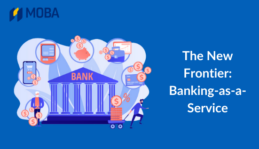Super Apps pervade practically every aspect of the Chinese digital lifestyle, swiftly taking over Southeast Asia and South America while also gradually entering the Western market. From ride-hailing services to hotel and flight booking, the rise of this all-in-one solution raises new questions for banks on how to ride this new wave to stay competitive in this ever-evolving environment.
What is a Super App?
Different from a single-purpose app which only offers one feature, a super app enables consumers to access a full spectrum of services using one integrated interface. China’s WeChat is a perfect example of a super app. Starting as a messaging platform, the app has extended its offerings into a ‘’lifestyle’’ super app with an ecosystem of more than a million mini-programs and approximately 200 million daily users.
The rise of Super Apps
As app fatigue sets in, multipurpose apps are gaining popularity due to their simplicity and convenience. By offering the benefit of a one-stop platform, super apps deliver seamless experiences that keep consumers engaged while saving them the hassle of downloading and managing multiple individual apps. Customers are also motivated to perform more of their activities on the super app to maximize those benefits. With integrated wallet offers and Open Banking, clients’ financial management tasks are completed in no time.
Due to the large unbanked population, great mobile-first affinity and homogeneity market, one-stop tech apps are booming in the Asia regions. Despite being an Asian phenomenon, this new breed of app is not warmly welcomed by Western consumers. Strict market regulations, fear of data breaches and maturity of economies are believed to be the obstacles to super apps growth in the market.
How Open Banking empowers Super Apps?
The wide adoption of Open Banking around the globe is enabling super apps to identify customers’ needs and offer financial services by using financial data from different sources. This will provide the platforms a greater chance to offer a wider range of functions and better target the appropriate services to each consumer.
Open Banking powers super apps by:
-
Optimizing personalization:
Open Banking generates an ecosystem that proactively assists apps in exploiting users’ data and establishing truly individualized experiences for them.
-
Convenience:
Through Open Banking data, clients can easily make online payments, monitor account balances, track past purchases and complete other standard banking activities via integrated digital wallets without accessing their digital banking apps.
-
Data insights:
With machine learning, analytics and AI, app providers can leverage Open Banking data to create well-loved products and cultivate a culture of data exchange and data-driven decision making throughout the business ecosystem
-
Engaging the right partners:
Super apps will have access to a larger pool of strategic partners as Open Banking enlarges farther into open finance and data, allowing faster time to market and wider customer base.
How will super apps affect banks?
Thanks to the omnipresence of Open Banking and application program interfaces (API), super apps can now incorporate financial services into their platforms, streamlining clients’ payment processes using integrated wallet options. And while super apps with digital wallets have not yet performed all banks’ functions, they make it easier for clients to stay in the ecosystem, leaving consumers with less time and needs to employ banking apps as well as alleviating their reliance on cash and credit cards.
Several financial institutions have already joined the super app ecosystem by offering ‘’banking as a service’’ to the platforms. As the regulatory framework surrounding financial services is so burdensome, super apps are increasingly forming strategic partnerships with banks to start offering e-commerce, loans, investing platforms and more.
Super apps, besides Neobanks and Fintech, might become a large source of competition for banks. By keeping consumers engaged on their apps, they make it harder for banks to persuade customers to opt out of the super app and utilize their standalone digital banking platform.
What are the options for banks?
With the tide swinging in favour of super apps, banks now face both opportunities and challenges, with three primary options to explore:
1. Improve and develop their own offerings and product suite
This route is ideal for well-established banks as their large customer base and proprietary data will enable them to retain the market share. Yet, banks will have to accept that their consumers employ super-apps for parts of their financial demands, potentially reducing profitability.
2. Embedding their services in existing super-apps.
Besides new revenue streams, becoming a banking-as-a-service partner can help banks leverage their brand within the super app ecosystem to generate a more seamless and frictionless user experience. Considering the limited number of super-apps on the market, banks will need to act quickly to secure a partner.
3. Launching their own super app
Banks may consider developing their own super apps if they want to play a more leading role. They can either create a one-stop shop that combines both financial and non-bank offerings or build a banking and financing super-app. This alternative demands forward-thinking banks that are willing to reimagine their business model to embrace the obstacles of creating an ecosystem of their own. To compete with the rising and established super apps, banks are advised to:
- Create a strategic vision: Financial institutions should determine what role they will play in this new era, whether a financial services or lifestyle ecosystem. Banks that can’t identify their niche would face difficulties in developing a successful product.
- Adopt advanced technologies: Open data architecture and APIs are two must-have components in building super apps as they rely on the information flow between entities. Data management capabilities such as machine learning and algorithms are also required to leverage customer data and build new user experiences.
- Ensure social responsibility: Consumers are becoming more eco-aware and interested in how their apps work and whether companies use a sustainable approach to app development. Privacy infringement is another issue that firms need to take into account. Robust security and safe data collection are crucial.
Given the rise of super apps, financial institutions are in the race to create an all-in-one solution for their users’ banking needs. For banks to tick all the boxes, software development partners play a huge role. A competent vendor will help organizations create a strategic product roadmap and increase the probability of success.
Want to build a mind-blowing super app?
KMS Solutions is here to help! Our team of skilled developers are more than ready to kickstart awesome digital solutions. Talk to our experts about your next potential super app here.







